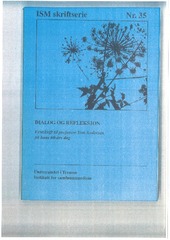Blar i forfatter "Wifstad, Åge"
-
Choice is not the issue. The misrepresentation of healthcare in bioethical discourse
Agledahl, Kari Milch; Førde, Reidun; Wifstad, Åge (Journal article; Tidsskriftartikkel; Peer reviewed, 2011-03-17)The principle of respect for autonomy has shaped much of the bioethics' discourse over the last 50 years, and is now most commonly used in the meaning of respecting autonomous choice. This is probably related to the influential concept of informed consent, which originated in research ethics and was soon also applied to the field of clinical medicine. But while available choices in medical research ... -
Clinical essentialising : a qualitative study of doctors' medical and moral practice
Agledahl, Kari Milch; Wifstad, Åge; Førde, Reidun (Journal article; Tidsskriftartikkel; Peer reviewed, 2010) -
Courteous but not curious: how doctors' politeness masks their existential neglect. A qualitative study of video-recorded patient consultations
Agledahl, Kari Milch; Gulbrandsen, Pål; Førde, Reidun; Wifstad, Åge (Journal article; Tidsskriftartikkel; Peer reviewed, 2011-05-24)Objective To study how doctors care for their patients, both medically and as fellow humans, through observing their conduct in patient–doctor encounters.<p> <p>Design Qualitative study in which 101 videotaped consultations were observed and analysed using a Grounded Theory approach, generating explanatory categories through a hermeneutical analysis of the taped consultations. <p>Setting A ... -
Dialog og refleksjon. Festskrift til Tom Andersens 60 års dag
Anderson, Harlene; Flåm, Anna Margrethe; Talberg, Pål; Forsdahl, Anders; Gergen, Kenneth. J.; Hartviksen, Ivar; Hoffman, Lynn; Høyer, Georg; Kjellberg, Eva; Korvald, Erik; kristiansen, Unni; Lebenbaum, Peter; Lindseth, Anders; McNamee, Sheila; Mjøs, Ole. D.; Penn, Peggy; Reichelt, Ebbe. G.; Reichelt, Sissel; Seikkula, Jaakko; Aaltonen, Jukka; Alakare, Birgitta; Shotter, John; Katz, Arlene M.; Stensland, Per; Søgaard, Anne Johanne; Fønnebø, Vinjar; Wagner, Judith; Wifstad, Åge; Øverberg, Gudrun; Aaraas, Ivar; Njølstad, Inger (Research report; Forskningsrapport, 1996) -
Helhetsforståelse og kommunikasjon. Filosofi for klinikere
Wifstad, Åge (Working paper; Arbeidsnotat, 1991) -
‘It’s like getting your car checked’: the social construction of diabetes risk among participants in a population study
Norddal, Guri A.; Wifstad, Åge; Lian, Olaug S (Journal article; Tidsskriftartikkel; Peer reviewed, 2022-01-31)In western industrialised societies, asymptomatic individuals are increasingly labelled as at-risk of future illness and targeted for public health interventions. These at-risk people are identified through health checks, population studies and national screening programs. The main purpose of communicating such risk to individuals is to motivate them to make lifestyle changes. Many of these risk-labels ... -
Modes of Interaction in Naturally Occurring Medical Encounters with General Practitioners: The ´One in a Million´ Study
Lian, Olaug S; Nettleton, Sarah; Wifstad, Åge; Dowrick, Christopher (Journal article; Tidsskriftartikkel; Peer reviewed, 2021-03-04)In this article, we qualitatively explore the manner and style in which medical encounters between patients and general practitioners (GPs) are mutually conducted, as exhibited in situ in 10 consultations sourced from the <i>One in a Million: Primary Care Consultations Archive</i> in England. Our main objectives are to identify interactional modes, to develop a classification of these modes, and to ... -
Negotiating Uncertainty in Clinical Encounters: A Narrative Exploration of Naturally Occurring Primary Care Consultations
Lian, Olaug S.; Nettleton, Sarah; Wifstad, Åge; Dowrick, Christopher (Journal article; Tidsskriftartikkel; Peer reviewed, 2021-10-09)Based on a narrative analysis of 20 naturally occurring clinical consultations between general practitioners and patients in England, sourced from the One in a million data archive, we explore how they conceptualize and negotiate medical and existential uncertainty. To capture the interactional element, which is often overlooked, three consultations receive special attention. While exploring the ...


 English
English norsk
norsk






